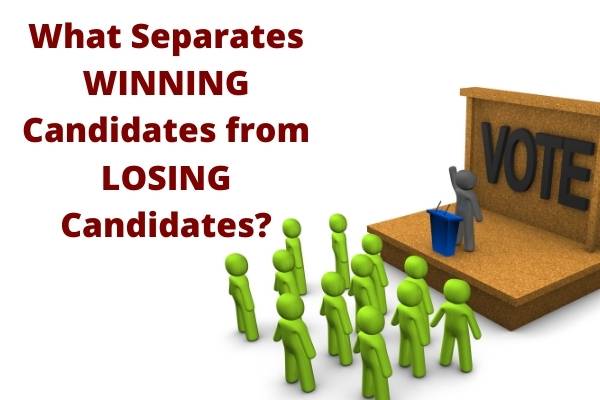What separates winning political candidates from those who lose elections? It’s more than just the number of votes.
There’s no such thing as a perfect campaign. Regardless of how hard a candidate may work, there are many factors that can contribute to an Election Day loss. Have you ever wondered what truly distinguishes the winners? It’s rarely as straightforward as the poll numbers might suggest.
Here are some key strategies and often-overlooked details that set successful campaigns apart from the rest:.
1) Failing to put together a campaign plan. You can enter a race late, but you can never start preparing for one early enough. Plan your election season calendar, organizational structure, fundraising strategy, and budget. Learn about the position you seek and the issues that will define the campaign. A robust digital strategy should be put together for your social media presence and how you will connect with people online.
2) Lacking a coherent campaign message. Through your issues and personal story, convey a clear and compelling vision for your community. Define yourself, define your opponents, and let voters know what’s at stake in the election. Stick to your talking points as repetition creates consistency in your positions. Your campaign message may need to shift as things change. But you should always stay true to what you stand for.
3) Focusing on issues that most voters don’t care about. In one local election where we live, a candidate constantly harped about the problem with dog waste on our sidewalks. She did it so much that we called her the ‘dog poop candidate’. With everything going on at the time in our area, stressing that particular issue over others simply did not motivate voters… and she lost.
4) Treating fundraising as a secondary task. Raising money for a campaign is hard and it takes time. Start early and start strong. Don’t limit gathering financial support from just friends and family. Weak fundraising efforts will prevent you from reaching your campaign goals. Set up online fundraising tools as early as you can. Budget for your initial fundraisers, and be realistic about how much you will be able to raise throughout the season.
Sometimes this becomes a chicken and egg situation, where you need to raise money to hold fundraisers, but you need fundraisers to raise money. Consider how you will raise seed money. It may be through a personal loan or through donations from close family and friends. You may not like or feel comfortable asking people to contribute, but it’s something you need to do if you plan on a political career.
5) Failing to personally reach out to others. Following the global events 2020, many candidates adopted and continue to effectively use remote campaigning techniques. While online events and connections are useful, don’t forget that the personal touch matters most whether reaching out to donors or voters.
6) Candidates that manage their own campaigns. A campaign manager should be dedicated to handling the day-to-day operations of a campaign, not the candidate. While some very local elected positions can be a single-person operation, most political campaigns are far too complex and time-consuming for an individual to handle without help. Campaign managers should typically be people with a lot of experience and connections in the community. They should also have a strong understanding of electoral rules and campaign management. They need to have a knack for networking, be willing to take risks, and have the ability to balance strategy with political acumen.
7) Putting too much priority on things that have little effect on the election. Sure, designing attractive campaign pins can be fun, but are they really that important? Focus on activities that will make a difference. For example, don’t overlook the role of your volunteers. If you don’t have a plan for how to engage them, you might not make the best use of them.
8) Spending too much money on polling and paid media outreach. Do not just rely on digital ads and email. Focus on building an organization of supporters and volunteers who will work toward promoting the campaign.
9) Spending too much, too soon. See point #1 on planning a budget. Set your campaign budget and stick to it. Underestimating how much you will spend can lead to a tough situation, especially in the last few weeks of a race. Getting additional donations in the final days can be helpful, but don’t count on them for your get out the vote efforts.
10) Failure to ‘make the ask’. This includes failing to make the ask for donations – and even failing to ask for a vote. Tell voters what you want them to do. Tell them on every print piece, and them on every page of your campaign website. If you are asking for donations, make it easy for them to do so. If you want their vote, don’t forget to give them the election date! When asking for support, just be straightforward. Whether it’s for donations or votes, make it clear how people can help.
It all makes a difference
If there is a common thread to this list, it’s that running for office takes a lot of preparation. We’ve seen personally, on a local level, people who really want to make a difference or want to make a change in their community just jump into the political process. They may run virtually alone, doing everything themselves and perhaps trying to do it on a shoestring budget.
Unfortunately, more times than not, these candidates don’t win. They may often be the best, most qualified candidate. They may know policy and they may know how to get things done.
The only thing they failed to learn was how to properly run a political campaign.
Don’t let it happen to you.
Read More: 5 Mistakes Political Candidates Make Online
With affordable political website packages and services, Online Candidate can help launch your digital presence.
Making Your Campaign’s FAQs Work Harder for You »
Tags: grassroots, local politics, messaging







